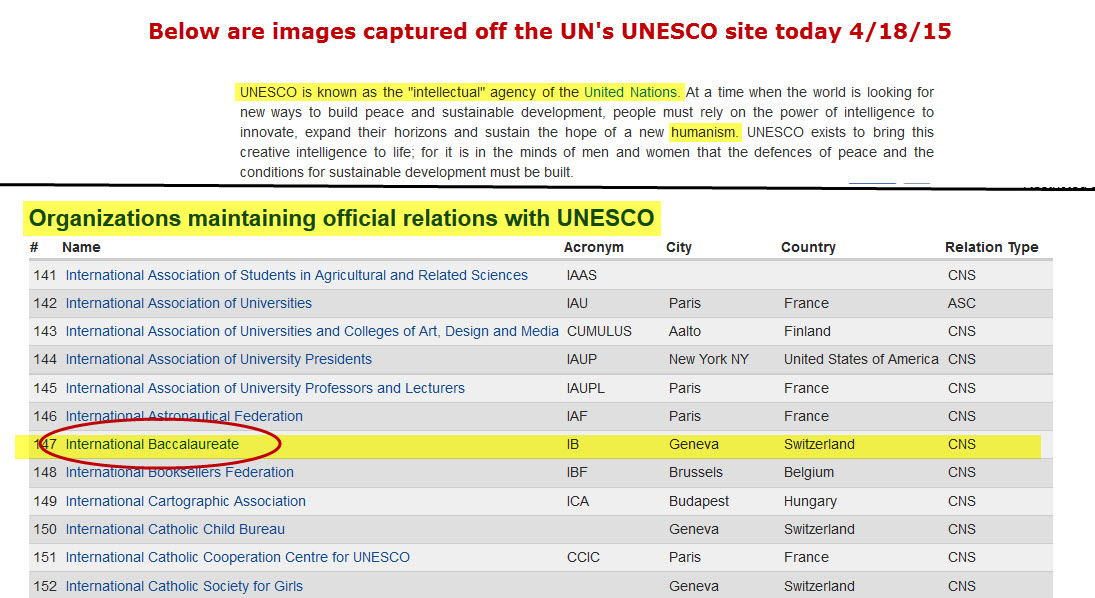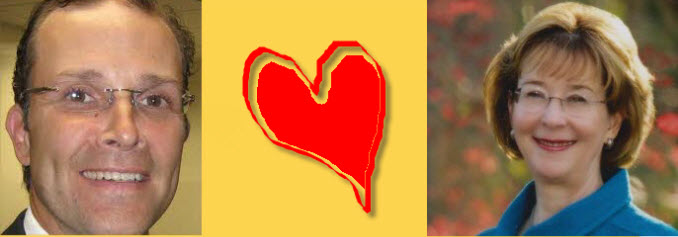What we have learned about International Baccalaureate
(IB)
by Duncan and Aileen Koler
We have three children who have attended public schools in Coeur d’Alene, Idaho. We have been thrilled with the education they received here – until IB was introduced. In January we made the difficult decision to withdraw our two youngest from public school and began home-schooling them. The main reason for this was what we discovered through our research about IB: political indoctrination has replaced good academics in our local public schools.
We will refer to the International Baccalaureate Program (IB), its related Middle Years Program, (MYP) for middle schools and Primary Years Program (PYP) for elementary schools collectively as “IB”. All three are “curriculum in a box” programs created and sold to individual schools by the International Baccalaureate Organization (IBO) in Geneva, Switzerland, in cooperation with the United Nations Education, Scientific and Cultural Organization (UNESCO). These programs are now being used in the Coeur d’Alene School District. Every child at Hayden Meadows Elementary School is now being taught this curriculum – there is no “opt out” opportunity.
Our introduction to IB came at Coeur d’Alene High School’s 2006 orientation assembly for incoming freshmen and parents. They announced that CHS had been accepted as an “IB School.” They excitedly told the assembly that the IB Program meant: (a) academic excellence; (b) guaranteed college credits for IB classes; and (c) preferential college admissions. They told us that IB was far superior to the successful Advance Placement (“AP”) program already in place. We were excited for our academically-oriented freshman son, and he decided to take IB courses that were going to be offered starting his junior year.
We began to question the IB curriculum when we learned significant classroom time in our son’s supposedly hard-science IB chemistry and math courses was being devoted to environmental and cultural topics such as global warming and human overpopulation, and the slant that came with the classroom discussions.
We decided to do our own research regarding the IB curriculum. We were shocked by what we discovered about what IB teaches, and the strategies underlying the curriculum. In addition to being extremely controversial in other parts of the country, we discovered IB is extremely expensive, that very few students ever obtain the vaunted “IB Diploma” and that colleges prefer AP over IB for class credits and admissions.
Our research left us with the impression that we had been sold a bill of goods by our school administrators, who never said anything about the controversies surrounding the IB Program, whose stated goal (as shown below) is to produce good “Global Citizens.” We believe an honest public discussion about these issues should have occurred before the IB Program funding began using taxpayer dollars.
Our research focused primarily on materials available directly from the International Baccalaureate Organization’s own website: http://ibo.org. In particular, we took the time to read the posted speeches given by IB administrators at its annual conferences, to learn how IB really sees itself and its mission. We found that IB’s mission is about pushing a UN social, economic and environmental agenda upon our children.
The IBO was formed in Geneva, Switzerland in 1968 under the guidance and funding of UNESCO (1). Today, the IBO is an “NGO” (Non-Governmental Organization) with formal ties to the UN (2). IBO works hand-in-glove with the UN to implement the UN and UNESCO’s educational objectives (3). To understand IB, you have to be aware of the overarching UN education campaigns that IB works to implement.
UNESCO has created a series of rolling/overlapping world-wide education campaigns. For example, 2001-2010 has been the UN’s “Decade for Teaching a Culture of Peace.” Peace is a worthy goal, but the UN (and consequently, IB) has its own ideas as to what teaching “peace” means. In its paper, “UNESCO – Mainstreaming the Culture of Peace,” UNESCO states its view that peace “is not simply the absence of war,” but requires equal distribution of economic and social resources (4). One of the “Action Areas” for the Decade for Teaching a Culture of Peace is to focus on teaching “sustainable economic and social development.”(5) This UNESCO paper presents redistribution of resources rhetoric at its best. It is apparent from reading it that “teaching a culture of peace” means teaching the UN’s viewpoint on all social, economic and environmental issues.
The IBO has been a major player in implementing the UN’s “Mainstreaming a Culture of Peace” campaign and this is reflected in an IB curriculum which strives to push the UN’s viewpoint in every one of its courses, even those such as math, chemistry and foreign language courses, which academically have nothing to do with these issues. Evidence: the IBO’s “Mid-Term Report on the International Decade for a Culture of Peace…,” addressed to “NGOs maintaining formal relations with UNESCO.” (6) On page 4 of this report, the IBO states its key difficulty in implementing the UN’s Culture of Peace program was, “realizing that peace education is not an add-on but an integral part of the curriculum at all levels.” (In other words, peace education concepts are injected in every course. This was our experience with our son’s IB math and chemistry courses at CHS.)
“Peace” and “Sustainable Development”
Overlapping both conceptually and time-wise with the UN’s Decade for Teaching a Culture of Peace, the UN has announced 2005-2014 as the “Decade of Education for Sustainable Development.”(7) This UN education campaign carries forward the UN’s concepts of economic and social justice through resource redistribution and environmentalism. Again, IBO is on the front lines of implementing this campaign’s goals. This conclusion is supported by looking at recent speeches and presentations given at annual IBO world conferences.
IBO’s Director General George Walker gave the keynote address at the Biennial Conference of IB Nordic Schools on September 9, 2005 (8). He confided that an “IB education” is not simply about a good academic education, but rather an education process geared toward creating the “true global citizen, the person who has the necessary intellectual skills, the cultural understanding and both the ability and the attitude that wants to shift another’s position as well as their own.” Dir. Gen. Walker goes on to speak glowingly of Marie-Therese Maurette, who was involved with UNESCO’s early efforts in the 1940’s to create a world educational framework, resulting in publication of a series of handbooks. Ms. Maurette’s views are revealing and echo those found in another UNESCO handbook, “In the Classroom with Children Under Thirteen Years of Age, Toward World Understanding-V,” (9) which contains the revealing quote at p. 44:
“As long as the child breathes the poisoned air of nationalism, education in world-mindedness can produce only rather precarious results. As we have pointed out it is frequently the family that infects the child with extreme nationalism.”
Dir. Gen. Walker winds up his remarks noting, “But the IB can only do so much and within each element of the curriculum, and particularly in creating the hidden curriculum that determines the school’s values, it will be the teachers and administrators who have an overwhelming influence.”(9) This statement helps explain why there is costly and continuous teacher training/indoctrination that is part of the IB Program.
In 2006, the IBO held an International Conference in Hanoi. Keynote speaker Dr. Peter Vardy spoke on the topic of “values education,” noting the need for IB to balance its focus on moral relativism with appropriate values teaching, begging the question, whose values? (10) Dr. Vardy labeled as “dangerous” any viewpoint that would teach good vs. evil, right vs. wrong, and specifically, the “American Way.” Conversely, while Dr. Vardy characterized Western Ideas as “confused,” he praised “Asian values,” including Chinese Confucianism, as the kind of “Universal Values” that should be taught. Dr. Vardy equated Christianity as a kind of “fundamentalism” on par with Islamic Fundamentalism (11).
As part of its implementation of the UN’s “Decade of Education for Sustainable Development,” the IBO held a regional conference in Singapore in October, 2007, with a presentation entitled: “Education for Sustainable Development: A Framework for Educational Reform.”(12) This presentation effectively communicates that “ESD” (Education for Sustainable Development) is based more on redistribution than conservation of resources. It notes that “values education” principles of peace and human rights are to be included in an integrated “ESD curriculum,” and aims for “integration of SD into all relevant subjects.”(13)
It is apparent from IBO’s own materials that Director General Walker was being absolutely candid in stating that IB education is not simply about getting a good education. IB’s goal is to indoctrinate our children with UN-Globalist values that are often at odds with American values and interests, and Judeo-Christian values. Although issues such as climate change, redistribution of wealth, the environment, global management of resources and disarmament are all hotly-debated political issues within our society, by allowing IB into our schools we are effectively allowing the UN free-reign to indoctrinate our children to their viewpoint. Thus, while we may reject many aspects of the UN’s agenda at this point, through our local schools and our children they are currently undermining the foundation of our future as a nation and a society founded on individual freedom and inalienable rights.
The above information was more than enough to cause us to withdraw our two youngest from public school, and motivate us to step well outside of our “comfort zone” by taking a public position that is contrary to the people and institutions we have placed our faith and trust in over the last 12 years. However, there is much more information available. We encourage you to educate yourself through your own research, to ask questions, and to insist on direct answers. (Also, be aware of what school programs you support financially, such as IB/PYP through “Extreme Raffle Baskets.”)
Additional Practical Reasons for Rejecting IB
First, the IB Program is expensive. According to figures obtained through a public information request, the program at CHS and LCHS alone has cost us $1,168,438 through 2008 and continues to cost taxpayers close to $150,000 per year. (This does not include the PYP costs.) Yet, out of only 411 students enrolled in IB classes at CHS and LCHS combined for ‘08-09, only 4.5% of IB students actually completed the Program (14). Instead of cutting teacher positions and/or salaries, we should be discussing ending an IB program that is more concerned with propagandizing our kids on political and social issues than teaching good academics.
Second, IB is not a good academic program. Every minute of class time in your child’s biology class (and other classes) spent on the need for resource redistribution or blaming mankind for Global Warming is time taken away from the core subject. At the primary school level, time spent developing the UN’s “true global citizen’s” proper social conscience is time not devoted to the basics. Perhaps that is why Fernan Elementary School’s principal Warren Olson recently suspended the school’s PYP program, noting that since its implementation, students’ test scores had “flat-lined.”
Third, the promise of college credits for IB courses and easier college admissions for IB students has proven doubtful. IB tests are graded with scores of 0-7. University of Idaho, Gonzaga and North Idaho College have all indicated they require a score of 5 or better for receiving college credit, and they often require students pass an oral interview to receive credit. Out of 103 total IB exams given at LCHS prior to this school year only 9 scores were 5 or better. Thus, less than 9% of the IB grades were eligible for college credit.
Fourth, there have been indications that some of our teachers may not be happy with the IB regime and curriculum. There has been a turnover involving well-respected teachers from Hayden Meadows moving on to other schools which coincided with Hayden Meadows’ implementation of PYP this past fall.
We feel strongly that it is time to start asking questions about our children’s education, and especially IB. Many of us came to North Idaho because of our relatively traditional and conservative values, or were raised here in North Idaho with such values. We have been astonished by the results of our research into IB, shocked that it is replacing quality education right here in our local schools, and frankly outraged that this controversial program was introduced without public discussion of the controversies.
For more information, please visit www.truthaboutib.com.
ENDNOTES
- See, “Founding Donors” at the IBO’s website, www.ibo.org.
- See, IBO’s completed “Questionnaire on the Implementation of the Programme of Action on a Culture of Peace, addressed to NGO’s maintaining formal relations with UNESCO,” found at: http://docs.google.com/viewer?a=v&q=cache:_ja_ZwoAlR4J:www3.unesco.org/iycp/Report/IBO.pdf+International+Baccalaureate+Organization+questionnaire+on+the+implementation+of+the+programme+of+action+on+a+culture+of+peace,+addressed+to+NGOs+maintaining+official+relations+with+UNESCO&hl=en&gl=us&sig=AHIEtbQOoVn0oDPtgQ_HjCG3okU16lK1Dw.
- Just enter “UNESCO” in the search window at the ibo.org web site.
- See, Mainstreaming the Culture of Peace, at p. 1, found at: http://unesdoc.unesco.org/images/0012/001263/126398e.pdf
- Id. at p. 10.
- Found at: http://docs.google.com/viewer?a=v&q=cache:_ja_ZwoAlR4J:www3.unesco.org/iycp/Report/IBO.pdf+International+Baccalaureate+Organization+questionnaire+on+the+implementation+of+the+programme+of+action+on+a+culture+of+peace,+addressed+to+NGOs+maintaining+official+relations+with+UNESCO&hl=en&gl=us&sig=AHIEtbQOoVn0oDPtgQ_HjCG3okU16lK1Dw.
- See, A Guide for Using the Earth Charter in Education, at p. 2, found at: http://www.earthcharterinaction.org/invent/images/uploads/EC_Education_Guide_2%20APRIL_2009.pdf. Please note earthcharter.org is another “NGO” working alongside UNESCO and IBO to achieve UN educational goals. The “Earth Charter” is “an earth-centered declaration which venerates global political-ethical-moral and spiritual education. Some, such as Mikhail Gorbachev have gone so far as to compare the Earth Charter with [the Ten Commandments].” Carl Teichrib, Social Engineering for Global Change, http://www.crossroad.to/articles2/04/teichrib-engineering-social-change.htm– citing, Mikhail Gorbachev, “The Earth Charter,” Speech: Rio+5 Forum, March 18, 1997, found at:[SORRY BROKEN LINK HERE:] http://web243.petrel.ch/GreenCrossFamily/gorby/newspeeches/speeches/speech18.3.97.html.
- Found at:http://www.ibo.org/ibap/conference/archive/documents/SheldonShaeffer-Plenary2AnOverarchingFrameworkforEducationalReform.pdf.
- Id. at p. 8.
- The full text of Dr. Vardy’s presentation can be found at: http://www.ibo.org/ibap/conference/2006regionalconf.cfm
- Id at p. 3-5 of the Word document of Dr. Vardy’s speech.
- See, http://www.ibo.org/ibap/conference/archive/documents/SheldonShaeffer-Plenary2AnOverarchingFrameworkforEducationalReform.pdf.
- Id. at 19-21.
- Apparently this low program completion rate is not unique to Coeur d’Alene, and signals that the IBO is less concerned with students actually completing the IB program than it is with exposing as many of our children as possible to UN Globalist doctrine.
- See, Carl Teichrib, Social Engineering for Global Change, http://www.crossroad.to/articles2/04/teichrib-engineering-social-change.htm; Allen Quist, The International Baccalaureate Curriculum, http://ednews.org/articles/the-international-baccalaureate-curriculum.html; Joseph Klein, Pennsylvania Schools Reject Indoctrination, http://97.74.65.51/readArticle.aspx?ARTID=5384; George Archibald, Learning Globally: U.N. Program Takes Root in U.S., http://www.freedomadvocates.org/articles/education_transformation/learning_globally:_u.n._program_takes_root_in_u.s._2004042091/









